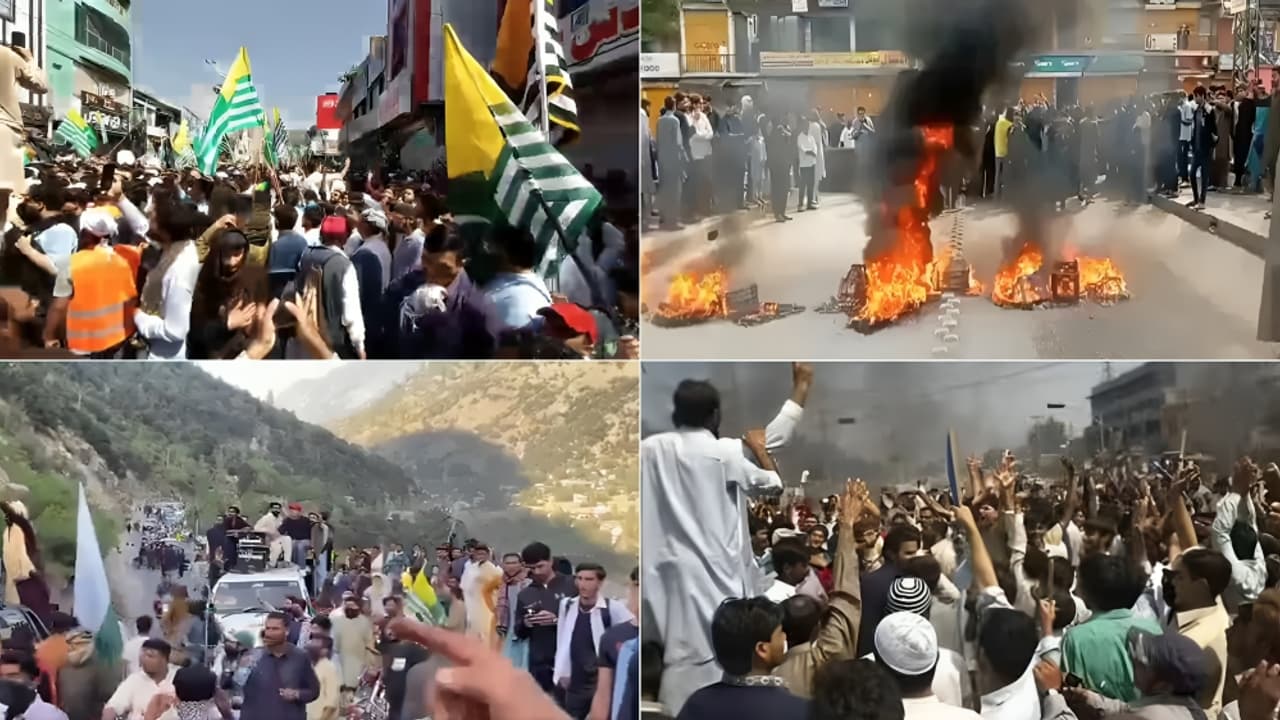Pakistan-occupied Jammu and Kashmir saw massive protests on fifth day, leaving at least 12 dead after clashes with forces. Protesters demand political reforms, tax relief, subsidies. United Kashmir People’s National Party chief sought UN intervention
Pakistan-occupied Jammu and Kashmir (PoJK) is witnessing one of the largest uprisings in decades as thousands of protesters clash with Pakistani security forces across multiple districts. The unrest, now in its fifth consecutive day, has left at least 12 civilians dead and more than 200 injured, many of them critically with gunshot wounds. Violence has spread from Muzaffarabad, the regional capital, to Rawalakot, Neelum Valley, Kotli, and Dadyal, despite heavy security presence and strict curbs on communication.
Casualties and crackdown
Reports confirm five protesters were killed in Muzaffarabad, five in Dheerkot, and two in Dadyal after security forces opened fire. At least three police personnel have also lost their lives in the clashes. Authorities have rushed thousands of additional troops to the region in an attempt to restore order, while enforcing a complete shutdown of internet, mobile, and landline services.
Markets, shops, schools, and transport services have been closed since the protests began on September 29, paralysing daily life.
Protesters’ demands
The protests are being led by the Jammu Kashmir Joint Awami Action Committee (JKJAAC), which has put forward a 38-point charter of demands. At the heart of the agitation is the demand to abolish 12 legislative assembly seats reserved for Kashmiri refugees settled in Pakistan, which locals say undermines their representation.
Protesters are also demanding tax relief, subsidies on flour and electricity, completion of long-delayed development projects, free healthcare, and education facilities.
Unprecedented slogans against Pakistan government
For the first time in decades, protesters in PoJK have openly raised slogans against Islamabad and the Pakistani military. Demonstrators chanted, “Rulers, beware, we are your doom” and “Kashmir is ours, we will decide its fate.”
Videos on social media show thousands of protesters marching through Muzaffarabad, toppling containers placed on bridges, and defying blockades set up by security forces.
Prime Minister Sharif’s response
Pakistani Prime Minister Shehbaz Sharif, currently in London, has announced the formation of a negotiation panel to hold talks with protest leaders. Appealing for calm, Sharif urged security forces to exercise restraint and patience, while assuring that the government was ready to address people’s grievances.
However, opposition leaders accused the government of mishandling the crisis and failing to respond to the worsening humanitarian situation.
Appeals for international intervention
Amid the escalating violence, Nasir Aziz Khan, spokesperson of the United Kashmir People’s National Party (UKPNP), appealed to the United Nations and international community for urgent intervention. Speaking at the UN Human Rights Council in Geneva, he warned of a looming humanitarian crisis in PoJK and accused Islamabad of committing grave human rights violations.
Escalation after earlier tragedies
This unrest comes shortly after Pakistan’s own military carried out deadly airstrikes in Khyber Pakhtunkhwa that killed 30 civilians, raising further anger against Islamabad. Protesters in PoJK have accused the government of treating its own citizens as enemies, with viral videos showing activists condemning the “demon-like” administration for “killing its own children.”
Defiance despite clampdown
Despite an indefinite lockdown, protest caravans from towns like Rawalakot and Mirpur have managed to break through security barriers and march towards Muzaffarabad. In Dadyal, local leaders announced that the body of a slain protester would not be buried until the administration met their demands.
The situation remains tense, with heavy clashes reported between protesters and security personnel on bridges and highways leading into major towns.
A turning point in PoJK
Observers say this is a rare moment when citizens of Pakistan-occupied Jammu and Kashmir are openly challenging Islamabad’s control. Analysts believe the movement could mark a turning point in the region’s politics, with widespread disillusionment over governance, economic hardships, and lack of representation fueling the anger.
Whether Pakistan PM Sharif’s negotiation committee can calm the unrest remains uncertain, as protesters insist they will not back down without concrete action.
